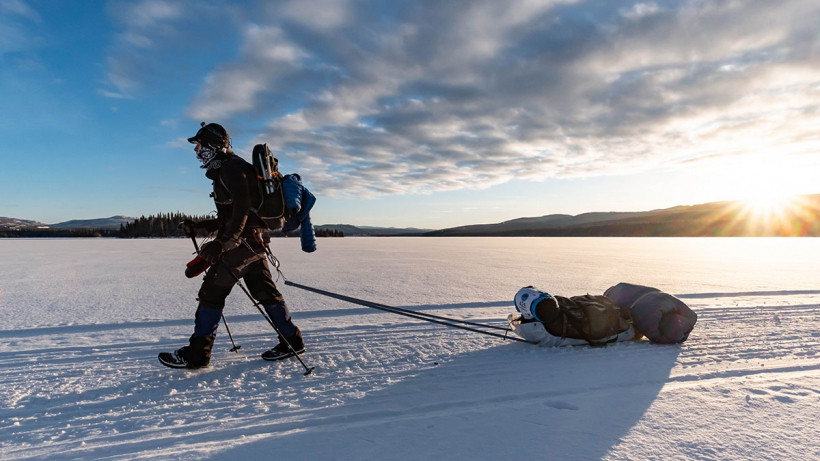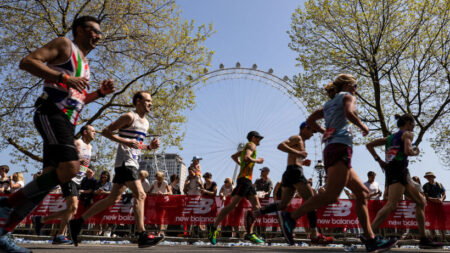Forget the Marathon des Sables, these beasts of races are almost guaranteed to break you
You’ve done the London Marathon. Sure, it was hard, but you wanted a tougher running challenge to set your sights on. You searched for something harder, a race with a bit of elevation. Snowdon Marathon looked perfect, so you did it and got round.
So what’s next? How do you push yourself to the limit of human endurance? The point where your body and mind begin to unravel? You, my friend, are ready to take on one of the world’s toughest races. Here, we’ve ranked them in order of the chances of you finishing the race – most likely to least likely.
Remember, some people actually enjoy doing these.
And if that wasn’t enough, check out our guide to the toughest sky running races.
Everest Marathon
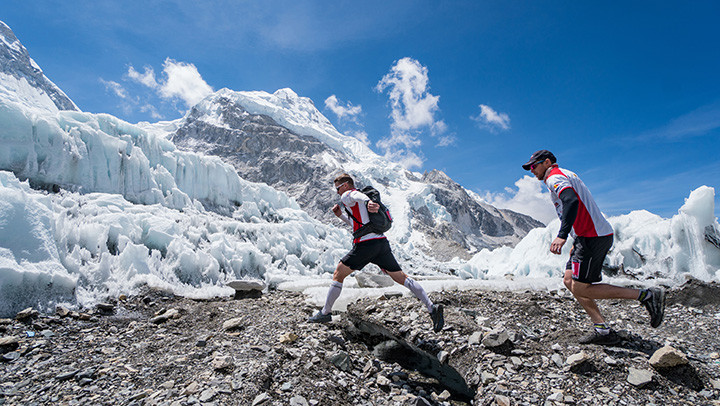
For those who aren’t fans of oxygen, this starts at an altitude of 17,500ft. Racers need at least two weeks to acclimatise to the oxygen-depleted air – and trek to the start – and you’ll be glad to know the route takes you largely downhill rather than up.
That doesn’t mean it’s lacking in climbs though – and at this height they feel five times as hard. And ditch that dream of a podium place, as the top 10 are usually local Nepalese Sherpas.
Finisher’s quote: “There’s an area on the way to Gorak Shep which is known for rockfall, so I was really keen to get past this quickly – and avoid getting hit by a rock.” Laura Jones
Where: Everest Base Camp
When: 29 May 2020
Distance: 37 miles
Elevation: 5,577ft
Per cent of non-finishers: Most runners finish, but if you miss the 4pm cut-off you have to restart at 6am with a 3-hour time penalty
Hardrock 100
Famous for its ridiculous level of elevation as well as its remote terrain, the Hardrock 100 is a race known for its toughness. Not only do runners take on 100.5 miles, but the average elevation of 11,000ft across the route means that participants need to be able to handle some major altitude.
To take part you need to enter a lottery where only 145 spots are available, which makes getting to the start line almost as tough as crossing the finish line.
Finisher’s quote: “Hardrock makes you feel very small. That’s a really challenging thing to accept.” Mike Foote,
Where: Silverton, Colorado
When: 17 July 2020
Distance: 100 miles
Elevation: 30,000ft
Per cent of non-finishers: 21%
Ultra Trail of the Gobi
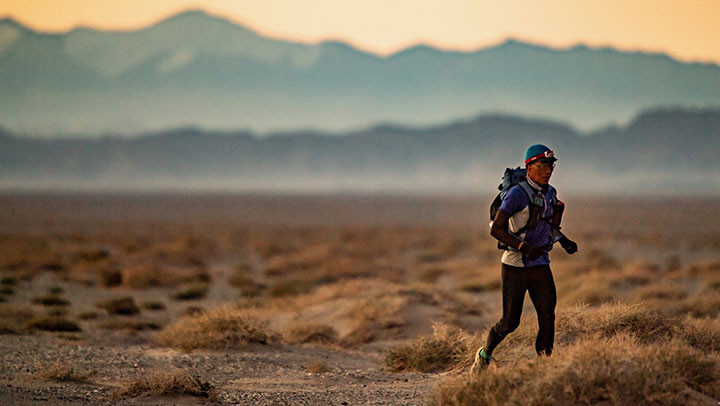
One stage, 273 miles across the inhospitable Gobi desert, 149 hours to complete it. It’s based on the journey undertaken by the 7th century Buddhist monk Xuanzang, which, admittedly, took him a few years rather than less than a week. He made a note at the time that “when it is hot, the heat sears you like a flame; when it is cold, the wind cuts your flesh like a knife”.
Finisher’s quote: “Ultra Gobi is the most difficult race I ever took part in. It made me learn a lot about myself, especially how to handle pain.” Clement Dumont
Where: Gansu Province, China
When: August 2020
Distance: 273 miles
Elevation: The official site says “the race does not have much elevation gain/loss”. Make of that what you will…
Per cent of non-finishers: 25%
Badwater 135
A generous cut-off time of 60 hours might make you think this is an easy road race. That is until you check out the temperatures you’ll be experiencing out on the course. The race starts in the Badwater Basin, the lowest point in the US, 280ft below sea level. Then it climbs and climbs, winding its way up to Mount Whitney at 8,500ft. Again, straightforward enough until you add in the fact that you are essentially running in a furnace – temperatures can reach a sole-melting 50C (122F).
Finisher’s quote: “Every time you inhaled the air was so hot that it seared your parched throat and stung your lungs.” Scott Jurek
Where: Death Valley, California, US
When: July 2020
Distance: 135 miles
Elevation: 14,600ft
Per cent of non-finishers: 30%
The Ultra Trail Mont Blanc
Most runners have heard of the UTMB, one of Europe’s biggest and toughest ultramarathons. Every year, 2,300 sufferfest fans gather in Chamonix’s town square as Vangelis’s Conquest of Paradise plays before they head out for a 105-mile ‘jaunt’ around Mont Blanc. With 46 hours in which to complete it, runners pass through rapidly changing weather, ankle-twisting terrain and sleep deprivation – the perfect recipe for a DNF.
Finisher’s quote: “[I’m ascending] one of the hardest climbs of the race. But I’m past being defeated. My whole existence is focused on just moving. This is the pain cave, this is where ultra runners look to go, to dig, hoping to find what they are made of.” Adharanand Finn
Where: Chamonix, France
When: 28 August 2020
Distance: 105 miles
Elevation: 32,808ft
Per cent of non-finishers: 31%
Cape Wrath Ultra
The organisers of this epic event describe it as Scotland’s answer to the Marathon des Sables, but given that the weather in the Highlands tends to be very different to that of the Sahara desert, the similarities between the races only really extend as far as the fact that both are tough as nails.
Participants in the eight-day event must cover 400km through some of the most remote and beautiful wilderness in Europe, starting at Fort William and finishing at Cape Wrath, the most northwesterly point of the British Isles.
The event takes place every two years in May, and the only thing you can predict about the weather is that it’ll be unpredictable, which means that the tough and frequently uphill terrain you’re tackling is only half the battle, at most.
In the the two races to date, the weather has been fairly kind and the finisher rate was still only 62% in both 2016 and 2018, so expect that number to plummet when an event is truly beset by inclement conditions.
Finisher’s quote: “I’m lying on my sofa, 3 days after finishing at Cape Wrath with two throbbing feet. Each with shin splints, showing up as tendonitis at each big toe joint. I have an infected left big toe, and a swollen burser of the hip. Each foot is slightly swollen, the only thing that has reduced since Monday are my cankles.” 2018 finisher Glenn Tait
Where: Scottish Highlands
When: 24th-31st May 2020
Distance: 400km
Elevation: 11,200m
Per cent of non-finishers: 38%
Spartathlon
Another race based on an epic journey, this time Pheidippides’ fatal trek to deliver a message asking the Spartans to help the Greek army. This is brutal for many reasons (aside from the distance) – the 75 checkpoints have strict, and challenging, deadlines you have to reach them by, which can make your pacing go out the window as you crash and burn before the halfway point. And that’s before you hit the calf-shredding 3,500ft climb up Mount Sangas at 100 miles.
Finisher’s quote: [At mile 100] “Running is no longer an option. It’s not a pain thing; I can take pain. It’s an impossibility thing. I am simply not able to run anymore. And still more than a marathon left to go.” Vassos Alexander
Where: Athens, Greece
When: 25-26 September 2020
Distance: 153 miles
Elevation: 3,937ft
Per cent of non-finishers: 38%
The Spine Race
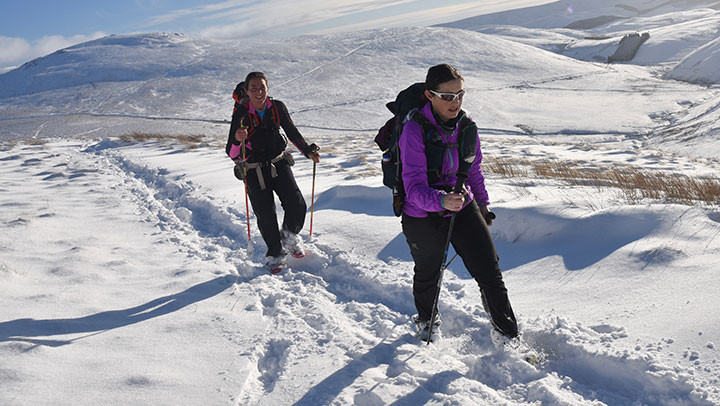
It’s difficult to dispute the Spine’s billing as ‘Britain’s most brutal race’. The route, heading north along the Pennine Way, is hard enough, but as it takes place in the middle of January you have Britain’s winter weather to contend with too. And it’s non-stop, so you’re trying to grab an hour of sleep when you can. Most runners who quit the race do so because they have succumbed to the effects of hypothermia.
Finisher’s quote: “It was the first time I’ve been to a race briefing where you could hear a pin drop. The competitors didn’t utter a sound as we sat and listened to the safety aspects of the race, signs of hypothermia and actually how potentially dangerous this race could be.” Mimi Anderson
Where: Edale, Peak District, UK
When: 12-19 January 2020
Distance: 268 miles
Elevation: 36,792ft
Per cent of non-finishers: 42%
The Plain
A 100-mile race across the remote trails of Plain may sound like a fairly standard ultramarathon, but this completely self sufficient 36-hour race places a hefty toll on participants. There’s no course markings or aid stations and many who attempt often find themselves lost across the vast open route. According to the organisers “It’s like climbing Mt. Everest without the aid of supplemental oxygen”. Which sounds nice.
Finisher’s quote: “You Know You’re in the Plain 100 when you decide to quit at 70 miles but have to drag yourself to mile 95 to find anybody who cares.” Martin Miller
Where: Plain, Washington
When: September 2020
Distance: 100 miles
Elevation: 21,000ft
Per cent of non-finishers: 50%
6633 Arctic Ultra
For this one, you’re above the Arctic Circle, meaning temperatures can drop to -40C, you have to drag a 30kg sled loaded with your belongings and winds can hit 30mph, leaving you frozen and alone. Aside from frostbite, you’re out there on the ice from 3am until midnight, on your own, for a week and a half, which means that for many the biggest battle is with your mind.
Finisher’s quote: “The flat part is the part that generates the most abandons, as people just can’t take the lack of direction. People have difficulty keeping balance. Everything is white so you don’t have any points of reference – it is easy to fall over.” Tiberiu Uşeriu
Where: Eagle Plains, Yukon
When: March 2020
Distance: 383 miles
Elevation: 12,887ft
Per cent of non-finishers: 58%
Tor des Géants
Here’s the stats: 25 peaks over 2,000m, 205 miles, 70,880ft of elevation gain. Feel your quads recoil at the thought? This is a toughie, no question. The name of the race translates as ‘Tour of the Giants’, as you will be circumnavigating Mont Blanc, the Matterhorn and Monte Rosa through almost every type of weather, from baking heat to zero-visibility hailstorms.
It’s a non-stop race, which means you have six days/150 hours to get round, and you choose when to rest and sleep. Last year there were so many foot injuries and blisters that the medical team needed three times more bandages than they had estimated.
Finisher’s quote: “The climbs just seemed to go on and on and on and just when I thought I was nearing the top I’d spot a headtorch in the distance heading away from the col in a different, much longer and higher direction.” Paul Tierney
Where: Courmayeur, Italy
When: 11-20 September 2020
Distance: 205 miles
Elevation: 70,880ft
Per cent of non-finishers: 60%
Montane Yukon Arctic Ultra
The Montane Yukon Arctic Ultra ramps things up a notch from the 6633 Arctic Ultra, pushing the distance to 430 miles, meaning it will take at least nine days to finish. You can opt to travel on skis or bike, but most go for foot, and frostbite is the biggest danger out there. Also, expect to hallucinate – competitors often report seeing monsters in the snow and ghostly aid stations.
Finisher’s quote: “The last night was dark, literally and figuratively. If you had asked me my name I would not have remembered it.” Christof Teuscher
Where: Whitehorse, Canada
When: 30 January-7 February 2020
Distance: 430 miles
Elevation: Unknown, but the highest point is 4,049ft
Per cent of non-finishers: 70%
Barkley Marathons
The Barkley Marathons has reduced some of the world’s most hardened ultrarunners to shells of their former selves curled up in the foetal position on the freezing ground. Race organiser Lazarus ‘Laz’ Lake likes to make it challenging and, as such, this means only 15 runners have completed the full five laps within the designated 60-hour limit.
Finisher’s quote: “The Barkley will find your weaknesses, and it will exploit them.” John Kelly
Where: Wartburg, Tennessee
When: Last weekend in April, 2020
Distance: Five loops of the course is approx 130 miles, but likely to be significantly more
Elevation: Approx 60,000ft
Per cent of non-finishers: No finishers in 2019
Enter: It’s a secret
Main image credit: Mark Kelly / Montane Yukon Arctic Ultra


